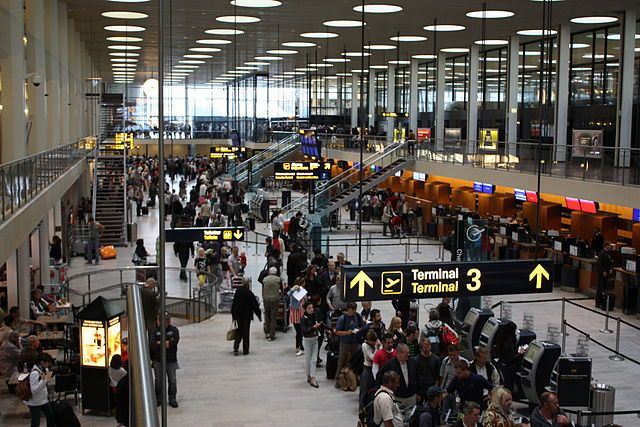The company that operates Copenhagen Airport has acquired a 900 million kroner loan from Nordic Investment Bank to finance further expansion that could see it realise its dream of increasing annual passenger numbers to 40 million.
The airport’s central safety control system will increase from 20 to 25 tracks and the overall number of gates will rise by seven – mainly in response to new Schengen Region requirements.
In addition, some 4,000 sqm will be added to Terminal 2, a new Metro bridge will connect Terminals 2 and 3, and the Terminal 3 floor plan will be optimised to improve passenger flows.
Door open for lower tariffs?
The deal follows an announcement in September that Australian capital fund Macquarie is selling its 26.9 percent stake to the ATP pension fund.
Macquarie opposed the wishes of the Danish state, which holds a 39.2 percent stake, to lower the tariffs to enable cheaper ticket prices for passengers and allow new routes to be established.
But it is believed ATP is in favour of lowering the tariffs.
Some 29 million passengers used Copenhagen Airport in 2016.
Intercontinental travel increase
Intercontinental travel from Copenhagen Airport has grown by 6.2 percent over the last year – 175,000 more passengers. In comparison, travel to European destinations has only grown by 0.7 per cent. Following a busy year for new routes, passengers can now fly directly to 34 intercontinental destinations, of which the most popular this year (as of December 12) were New York (0.342 million), Dubai (0.320), Dohar (0.259), Bangkok (0.257) and Toronto (0.149).
Best result for SAS in two decades
SAS has declared a pre-tax profit of 1.3 billion kroner on turnover of 31.7 billion kroner for its 2016-17 fiscal year – its third consecutive year in the black and quite possibly its best result for 20 years. However, while passenger numbers increased by 3.4 percent, the airline’s debt remains high. The Danish state currently own a 14.2 percent stake in the airline, and along with Sweden (17.1) and Norway (11.4) controls over 40 percent.
New courses in IA and robotics
The Ministry of Education and Research has approved 19 new university courses, and among them is a MA in robotics and a BA in technical/data science & artificial intelligence. “We must constantly adapt education to the needs of the labour market, so we can educate properly for what is needed in the future,” commented the education and research minister, Søren Pind. Other new courses include BAs in crafts (glass and ceramics), taxation, and media/social media.
Lucrative deal for radar experts
Danish engineering company Weibel Scientific has won a three-digit million kroner contract to deliver three radar systems to the US military that will principally be used to track drones. Based in the Greater Copenhagen suburb of Allerød, Weibel Scientific expects to increase its 100-strong workforce by 10 percent to fulfil the contract.
READ MORE: Establishing Denmark as a major player in the sports equipment market
Design company picked up by US rival
US design company Knoll has agreed a deal to buy Danish furniture and accessories design company Muuto for 1.9 billion kroner from capital fund Maj Invest. Founded in 2006, Muuto enjoyed a 2016 turnover of 475 million kroner and profit of 57 million.
Contactless limit to rise to 350 kroner
From January 1, Dankort holders will be able to make contactless purchases of up to 350 kroner. The current limit is 200 kroner, above which a PIN code is required. At present, around 60 percent of all physical Dankort transactions are for an amount below 200 kroner, and about two-thirds are contactless. Some 85 percent of transactions are for an amount under 350 kroner.
Bakken to open off-season
Since its foundation in 1583, Bakken, the world’s oldest themepark, has only ever opened during the summer. But next year, it will open during the autumn half-term holiday and in the month leading up to Christmas. Bakken head Niels-Erik Winther cited high demand and fewer restrictions in Dyrehaven, the deer park in Greater Copenhagen suburb Lyngby in which it is located.
Ministry optimistic about economic future
The Ministry of the Economy and the Interior expects Denmark’s GDP to grow by 1.9 percent in 2018 and by 1.7 percent in 2019. Additionally, employment will increase by 33,000 in 2018 and by 23,000 in 2019, it predicts.
















